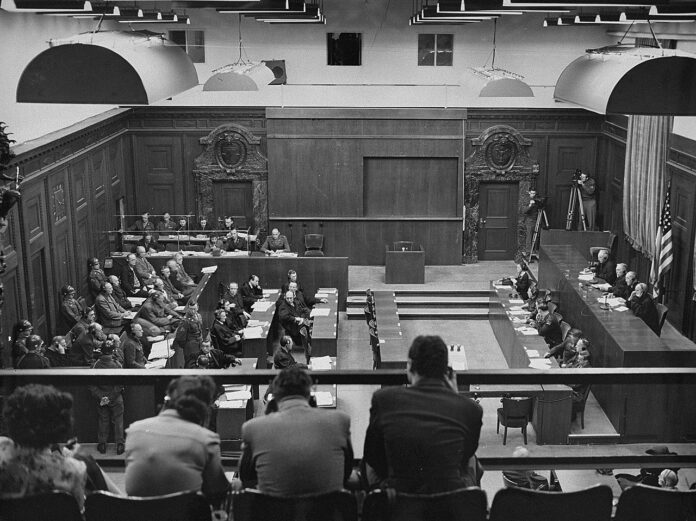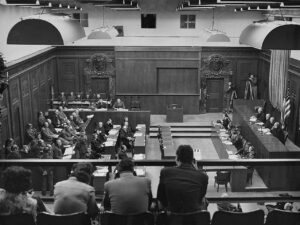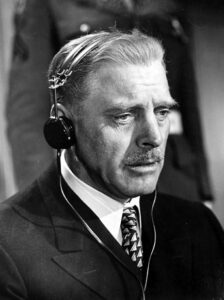
Judgment at Nuremberg
Why did Judges Capitulate to Hitler?

Judgment at Nuremberg (1961) written by Abby Mann and directed by Stanley Kramer is a black and white movie that communicates the truth in black and white. The film shows the trial of four Nazi Judges and one Nazi prosecutor and the predicament of Judge Dan Haywood (Spencer Tracy) who heads the tribunal in which they are prosecuted. The film is based on the ‘Judges’ Trial’ conducted by the US Military Tribunal at Nuremberg between March and December 1946.
The questions this film asks are complex – how could eminent judges and jurists, well-versed in jurisprudence and writers of treatises and constitutions, wearer of the Black Robe capitulate to Hitler? How could they not see the terrible and unjust reality around them? Why did they fail in interpreting the signs of a totalitarian regime? Was it fear of Hitler or hatred of the ‘undesirables’ or cowardice? Were these Judges perverts and maniacs to have ordered people to be sterilized or sent to concentration camps?
One of the accused says that he is ‘not guilty’ because after all he was merely implementing the law of the state as it existed at the time – he was not making the law, merely interpreting them. This stand which sounds very logical on the surface, raises the question of what takes precedence – law or justice? If the written word of the law is all that counts then the Nazi Judge is right, but if there is a larger concept of justice then the concern for upholding such justice should over-ride the mechanical task of implementing laws.
Amongst the accused is the eminent Dr. Ernst Janning (Burt Lancaster), a man highly respected in Germany for his superior intellect and uprightness. Initially he refuses to accept the mandate of the tribunal to conduct the trial and pleads ‘not guilty’ on all charges, but things change when the prosecutor brings up the Feldenstein case in which he had been the Judge. The Feldenstein case was a scandalous matter in which an elderly Jewish man was accused of ‘Racial Pollution’ and sentenced to death for having sexual relations with a sixteen year old German girl, who vehemently denies the charge saying he was like a father to her. She too suffers imprisonment for perjury. Now, the prosecution brings the same girl on stand to indict Ernst Janning. The defense lawyer (Maximillian Schell) harasses the girl in the witness stand in open court while cross-examining her, and this leads to Ernst Janning breaking his silence.
In an unforgettable speech Ernst Janning takes the witness stand and confesses how he had already made up his mind to convict the Jewish man even before hearing the evidence. Then he tells in detail how and why Judges in the Nazi Regime behaved in the manner they did.

“There was a fever over the land, a fever of disgrace, of indignity, of hunger. We had a democracy, yes, but it was torn by elements within. Above all there was fear, fear of today, fear of tomorrow, fear of our neighbors, and fear of ourselves. Only when you understand that can you understand what Hitler meant to us, because he said to us:
“Lift your heads. Be proud to be German. There are devils among us, communists, liberals, Jews, gypsies. Once these devils will be destroyed your misery will be destroyed.”
It was the old, old story of the sacrificial lamb.
What about those of us who knew better, we who knew the words were lies and worse than lies? Why did we sit silent? Why did we take part? Because we loved our country. What difference does it make if a few political extremists lose their rights? What difference does it make if a few racial minorities lose their rights? It is only a passing phase. It is only a stage we are going through. It will be discarded sooner or later…
And history tells how well we succeeded, Your Honor. We succeeded beyond out wildest dreams. The very elements of hate and power about Hitler that mesmerized Germany, mesmerized the world. We found ourselves with sudden powerful allies. Things that had been denied to us as a democracy were open to us now.
And then, one day we looked around and found that we were in an even more terrible danger. The ritual begun in this courtroom swept over the land like a raging, roaring disease. What was going to be a “passing phase” had become the way of life.
Your Honor, I was content to sit silent during this trial. I was content to tend my roses. I was even content to let counsel try to save my name, until I realized that in order to save it, he would have to raise the specter again. You have seen him do it. He has done it, here, in this courtroom. He has suggested that the Third Reich worked for the benefit of people. He has suggested that we sterilized men for the welfare of the country. He has suggested that perhaps the old Jew did sleep with the 16 year old girl after all. Once more, it is being done — for love of country.
It is not easy to tell the truth. But if there is to be any salvation for Germany, we who know our guilt must admit it — whatever the pain and humiliation.
I had reached my verdict on the Feldenstein case before I ever came into the courtroom. I would have found him guilty, whatever the evidence. It was not a trial at all. It was a sacrificial ritual in which Feldenstein, the Jew, was the helpless victim.
I am aware. I am aware! My counsel would have you believe we were not aware of the concentration camps. Not aware. Where were we? Where were we when Hitler began shrieking his hate in Reichstag? Where were we when our neighbors were being dragged out in the middle of the night to Dachau?! Where were we when every village in Germany has a railroad terminal where cattle cars were filled with children being carried off to their extermination?! Where were we when they cried out in the night to us? Were we deaf? Dumb?! Blind?!!
My counsel says we were not aware of the extermination of the millions. He would give you the excuse: We were only aware of the extermination of the hundreds. Does that make us any the less guilty? Maybe we didn’t know the details. But if we didn’t know, it was because we didn’t want to know.”

And thus, the audience understands that the matter was never as simple as judges implementing the law of the land – they were in fact implementing the terrible Nazi ideology. The ‘honourable’ Judges of the Nazi regime sent millions to death because they bought into the propaganda of nationalism, the hyper-nationalism, the desire for the one strong leader who would lead them out of misery and establish the name of Germany the world over. They were so mesmerized by this singular project that they forgot to perform their basic duty as a judge – to hold the state authorities accountable for their actions, to ensure that the innocent is protected, to act independently of the political arm of the state, to ensure that political considerations do not over-ride the considerations of justice. They conflated love for Germany with obedience to Hitler and this was their hubris.
The film ends with the Cold War setting in and the compromised manner in which the US authorities including the prosecutor act in order to ensure that German sentiments are not alienated – after all, they need Germany as an ally in their war against Communist USSR. It is thereby indicated that they too are not immune from the considerations of ‘national security’.
In a final scene, Ernst Janning begs Judge Haywood to understand that although he had sentenced one Jewish man to death, he did not know of the millions who were being killed in the concentration camps. Judge Haywood replies, “It came to that the first time you sentenced a man to death that you knew to be innocent.”
This is an important film that remains extremely relevant to this date. It speaks from the past and forces one to confront the reality of the times they live in. One may not be a Judge in the Courtroom but each one is a judge of what goes on in their lives and localities. It is a film that rings the warning bell about political propaganda, especially propaganda that accompanies hyper-nationalism.
Judgment at Nuremberg is a 3 hour long film but every moment resonates, leaving an impression that is not easily forgettable.
The film is available on Prime Video.
- Paromita Goswami


